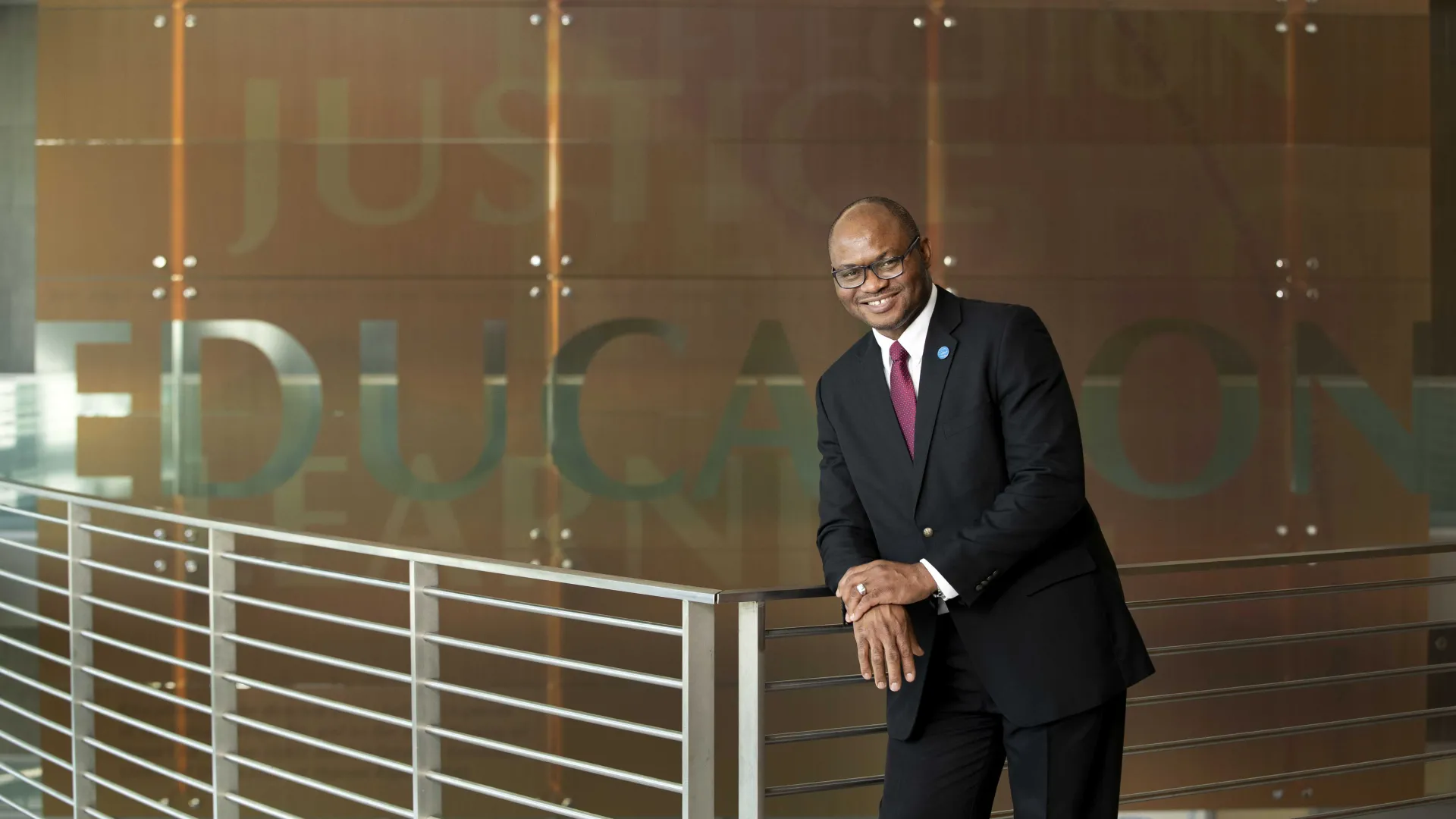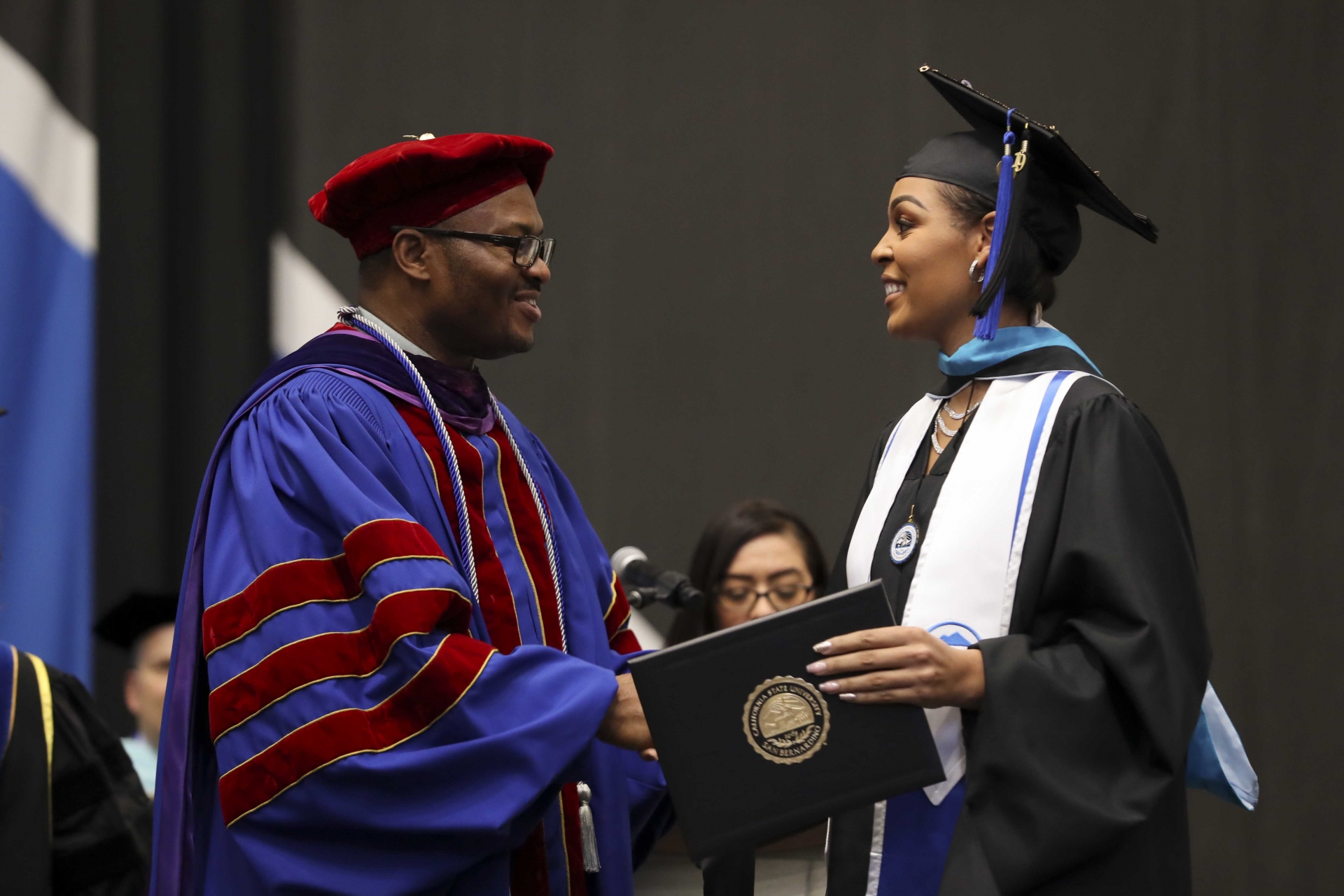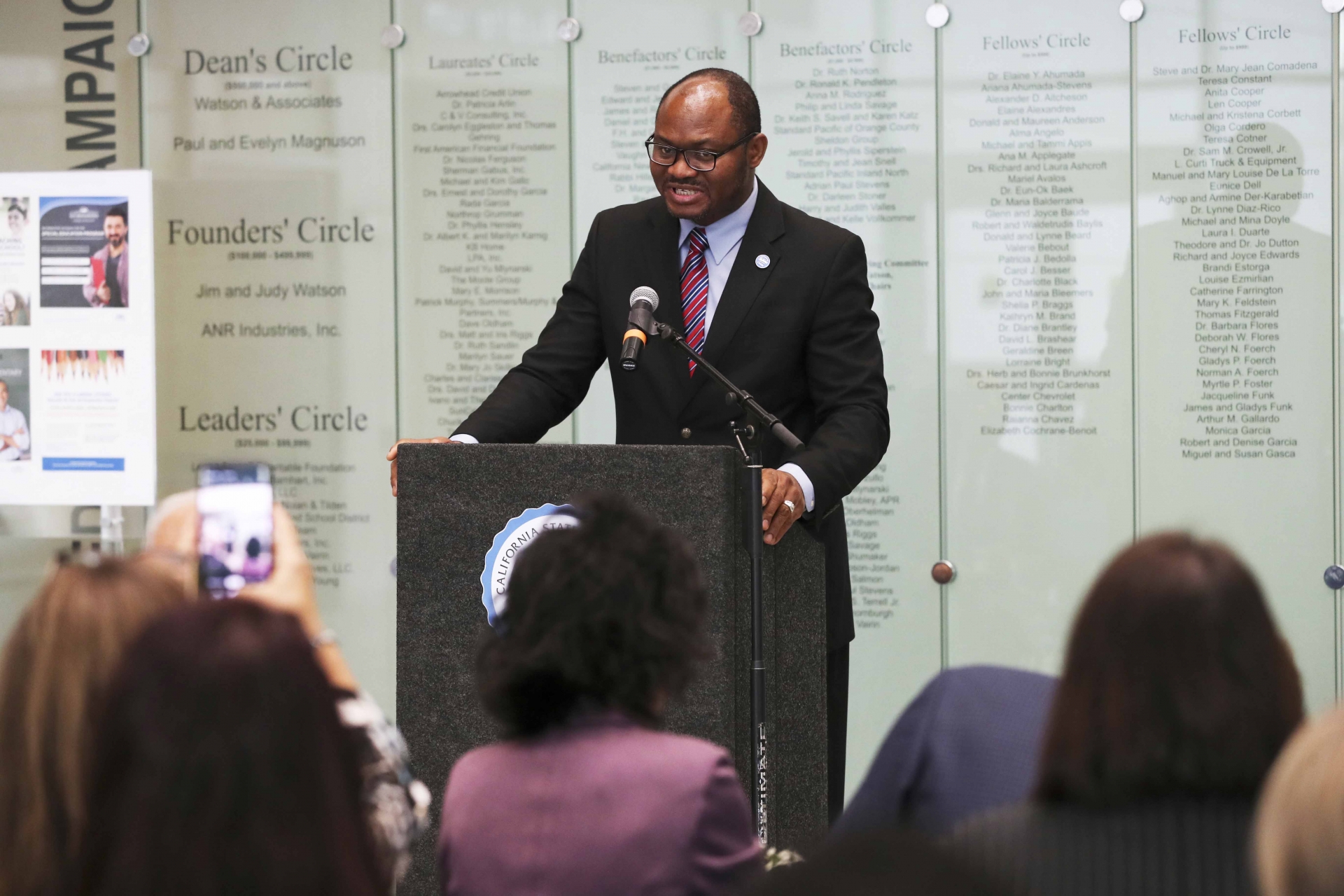Joe Gutierrez | CSUSB Office of Strategic Communication | (951) 236-4522 | joeg@csusb.edu


When Chinaka DomNwachukwu joined Cal State San Bernardino to lead the College of Education as dean in June 2019, he had a number of goals that he wanted to implement to help the college grow to continue its exceptional service to the community.
DomNwachukwu (pronounced Dom-wah-choo-coo) said that included increasing the number of credential students – especially African American males – in graduating and becoming teachers, enhancing collaborations with Inland Empire school districts, helping CSUSB junior faculty in professional growth, and growing the college’s dynamic Doctor of Education in Educational Leadership Program.
Since his arrival, the college has taken a number of steps toward achieving those goals, especially along the lines of programs and collaborations of increasing the diversity of credentialed students, particularly African American males. But DomNwachukwu, who came from the Azusa Pacific University School of Education and has more than 20 years of leadership experiences in various roles at the private university, said the goals complement the CSUSB College of Education, which is already a dominant player in the two-county area in teacher preparation.
“When you look across the Inland Empire region, San Bernardino and Riverside counties have a significant number of school site administrators, teachers, as well as district leaders that are products of the Cal State San Bernardino College of Education,” he said.
We have “an endless list of educators who have made significant impact in the region, people who have gone through our college. We continue to produce high quality teachers, counselors, school psychologists, as well as business leaders,” DomNwachukwu said. “So for the college, one of our greatest strengths is that we are positioned – well-positioned – to continue to make a long, lasting impact in the region.”
He credits the college’s faculty.
“That's one of the strongest areas we have. All that is possible because we have good faculty members, faculty members who are committed to what they do,” DomNwachukwu said. “They are good researchers and good practitioners, and they invest a good amount of their time and resources into what they do. A number of them are very well-engaged with the K-12 community.”

He also praised the Department of Teacher Education, which he called “the hub of the College of Education because they produce the teachers, multiple and single subject credential students. They have the largest number of enrollments, and they continue to work hard. The same is true of the Special Education program in the Department of Special Education, Rehabilitation and Counseling.”
During the COVID-19 pandemic, he said these programs have risen to the challenges of trying to navigate teacher job placement in virtual K-12 classrooms.
“I was surprised at the end of spring that we were able to still graduate at least 300 credential students and were able to increase our enrollment in those programs by 30 percent in fall of 2020,” DomNwachukwu said.
He also gave kudos to the college’s counseling and psychology programs that continue to perform very well with good graduation and job placement rates. The same is true with the Educational Leadership and Administration program.
He said increasing the number of diverse students – especially African American males – to become K-12 teachers came from his own teaching experiences.
“I began my own teaching career as a young Nigerian man in East Los Angeles, where I was the only black teacher, and there were often two or three black students in the school. So I also knew the difference my presence made in the lives of those few students,” DomNwachukwu said. “You need male figures in the school setting, especially for minority kids, to have them connect with education as something that’s within their reach.”
In his vision for the College of Education to continue to make an impact in the community led to the launching of Project Impact, a program created to increase the number of credentialed K-12 teachers in the state and focus on increasing minority male teachers.
“Our goal was to recruit these men, prepare them, specially equip them with skills and competencies that will help them succeed in the K-12 setting, and provide them support to help them stay in the teaching field,” DomNwachukwu said. “One of the problems of California education is that we lose a significant number of teachers within the first five years of credentialing them. One of my goals is that we will be able to retain these teachers much longer.”
With the Project Impact program, the college has received support from the Riverside County Office of Education to help pay for two-thirds of the tuition of the first 10 students enrolled, DomNwachukwu said.
“I was able to explore other resources and avenues to pay the other one-third. So they (the 10 students) are going to be finishing their programs without any cost to themselves,” said the dean. “Right now, we are working with school districts trying to have them get jobs upon graduation.”
The college is also working with the Riverside and San Bernardino offices of education, the Blue Foundation and the Growing Inland Achievement (GIA) to create the Inland Empire Minority Teacher Pipeline Program. It would be a regional collaborative to increase the minority teacher pipeline because they believe that it will make a significant impact in the life of region’s K-12 students, DomNwachukwu said. “CSUSB’s College of Education is leading this initiative, and we are excited about the partners who have joined us in this effort.”
Another area the dean is focusing on is helping to develop the college’s new and junior faculty in providing them support toward promotion, toward publications and overall professional growth. Last fall, the dean appointed a director of Faculty Support and Development, who is tasked with leading this initiative.
“We want to leverage resources to help them succeed,” he said.
He hopes to add a similar program for college staff.
“One of the things we’re hoping to add this year is a staff version. We have started a conversation in which we’re going to begin to put together a structure that will allow us to create programs that will help our staff members be able to get some kind of ongoing professional support and development activities going on for them,” he said.

He also hopes that in working with the leadership of the college’s Doctor of Education in Educational Leadership Program, it can be further developed in the next four years to emerge as a program of choice for anyone interested in K-12 leadership and community college leadership.
He said the program has been revamped and streamlined. Now students will complete coursework, take their comprehensive exams at the same time, and then be able to move on to the dissertation phase. Previously, many students could not transition from their coursework into dissertations; many were not passing the comprehensive exam because of the way it was structured in the program sequence.
Students have been notified that they have a timeline to finish the program. “That has made a huge difference,” he said, adding they are “trying to hire a staff director who is going to work with our Ed.D. students directly, along with the faculty members, to help provide more hands-on support for them as they go through their dissertation process.”
The college has also worked to revamp the Instructional Technology program, which is housed in the Department of Educational Leadership and Technology.
The program traditionally has depended on people to come from anywhere, take classes in instructional technology, as the program did not have any direct overlap with the teaching programs.
“So the enrollment has continuously been very low because not many teachers want to finish their credential and come back to get a master’s degree in instructional technology,” he said.
The program has been revamped so that two certificates in the program, E-learning and Educational Technology, have been merged into the single-subject credential program.
“So that when the students who are in the single-subject credential program finish their credential, they are also leaving with two digital learning certificates,” DomNwachukwu said. “So that gives added value to the single-subject program.”
In the future, when the pandemic is a thing of the past, DomNwachukwu hopes to enhance the college’s STEM education program. Talks had been initiated, but were put on hold because of COVID-19, he said.
“One of my goals is that CSUSB’s College of Education would be a go-to place for preparing STEM educators who are going to be able to have impact in our community,” DomNwachukwu said. “The goal is to partner with the local school districts so we can do a more enhanced preparation for teachers who teach in these STEM fields using a clinical model that allows for a collaboration between our college and the school district sites and give these teachers more hands-on engagement.”
“I’m just looking at where do we have opportunities for growth and where can we enhance what is going on already,” he said.